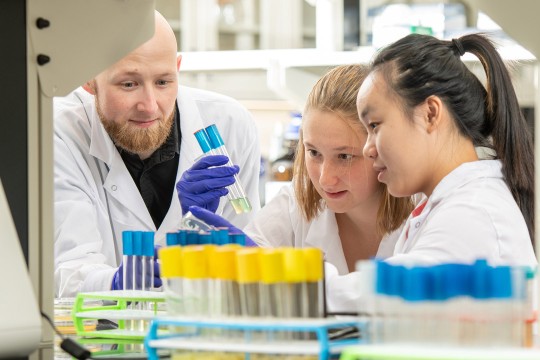Applied Statistics and Data Analytics Bachelor of Science Degree

Applied Statistics and Data Analytics
Bachelor of Science Degree
- RIT /
- Rochester Institute of Technology /
- Academics /
- Applied Statistics and Data Analytics BS
Gain a strong foundation in statistical methods, computing tools, and real-world applications with RIT’s BS in applied statistics.
$77K
Median First-Year Salary of RIT Graduates from this degree
47%
Job postings that require skills in statistical software like SAS or R
34%
Employment growth expected for statisticians by 2026, four times faster than the overall labor market
#1
Ranking for Statisticians in Best Business Jobs List, U.S. News & World Report, 2020
Overview for Applied Statistics and Data Analytics BS
Why Study Applied Statistics and Data Analytics at RIT
Career Connections: Network with recruiters from National Labs and federally-funded Research Centers to explore co-op, internship, research, and full-time employment opportunities.
Gain Work Experience: Complete a co-op or internship, engage in undergraduate research, or study abroad to gain real-world experience.
Jobs at Industry Leading Companies: Recent graduates are employed at Freehold Capital Management, Qool Media, Excellus BlueCross BlueShield, 3M, and General Electric.
A Robust Community: Join PiRIT, a student club that fosters a community of students and faculty in mathematics and statistics.
Accelerated Bachelor’s/Master’s Available: Earn both your bachelor’s and your master’s in less time and with a cost savings, giving you a competitive advantage in your field.
STEM-OPT Visa Eligible: The STEM Optional Practical Training (OPT) program allows full-time, on-campus international students on an F-1 student visa to stay and work in the U.S. for up to three years after graduation.
RIT’s bachelor of science in applied statistics gives you an advantage in the fields of business, government, and industry, and prepares you for advanced graduate studies. Diverse application areas for graduates include product design, biostatistics, data analytics, quality control, and statistical forecasting.
What is Applied Statistics?
Applied statistics is data analysis. It’s managing, analyzing, interpreting, and drawing conclusions from data in order to make sound decisions in a wide range of fields, including engineering, business, health care, government, retail and commercial enterprises, and more. In applied statistics, you’ll use data to identify problems and through the analysis of this data, determine solutions and opportunities.
RIT’s Bachelor of Science in Applied Statistics and Data Analytics
Early courses in the statistics bachelor's degree are designed to give you a foundation in calculus, statistics, algebra, and computer science. You will graduate with:
- A strong foundation in statistical methodology and experience in its applications
- A solid background in the use of statistical computing packages
- The skills to collaborate on projects that rely on statistical analysis.
Furthering Your Education in Applied Statistics
Graduate programs offered by the School of Mathematics and Statistics introduce students to rigorous advanced applied mathematical and statistical methodology. Students realize the potential for that cutting-edge methodology as a general tool in the study of exciting problems in science, business, and industry.
Combined Accelerated Bachelor’s/Master’s Degrees
Today’s careers require advanced degrees grounded in real-world experience. RIT’s Combined Accelerated Bachelor’s/Master’s Degrees enable you to earn both a bachelor’s and a master’s degree in as little as five years of study, all while gaining the valuable hands-on experience that comes from co-ops, internships, research, study abroad, and more.
- Applied Statistics and Data Analytics BS/Applied and Computational Mathematics MS: Combine your applied statistics and data analytics BS degree with a master’s in applied and computational mathematics to obtain a deep knowledge of mathematical and statistical analysis that employers are looking for. These complementary programs prepare graduates for careers in a broad spectrum of industries from health care to insurance to communications and beyond. Get the background you need in mathematics and statistics coupled with the applied training that will set you apart in computing, modeling, and analysis to launch a career in an industry that excites you.
- Applied Statistics and Data Analytics BS/Applied Statistics MS: Become a statistics professional with this combined accelerated dual degree. You’ll study statistical methodology, applications, and computing that you can apply to an industry that interests you such as insurance, government, health care, and more. With employment opportunities for statisticians continuing to grow, graduates of this degree pathway go on to excellent job placements with great starting salaries at companies like Excellus, Regeneron Pharmaceuticals, L3Harris, and Capital One, just to name a few
- +1 MBA: Students who enroll in a qualifying undergraduate degree have the opportunity to add an MBA to their bachelor’s degree after their first year of study, depending on their program. Learn how the +1 MBA can accelerate your learning and position you for success.
Advanced Degrees in Mathematics and Analytics
Students in the applied mathematics bachelor’s degree are exposed to rigorous advanced applied mathematical and statistical methodology as a tool in the study of exciting problems in science, business, and industry. Many undergraduate students choose to continue their education with one of RIT's advanced degrees in mathematics or analytics:
-
Join Us for Accepted Student Open House
Visit campus on March 28 or April 11 to meet faculty, tour campus, and ask your questions.
-
Join us for Fall 2026
There's still time to apply. For some programs, applications will be reviewed on a rolling, space-available basis.
Careers and Cooperative Education
Typical Job Titles
| Statistician | Biostatistician | Data Scientist |
| Quantitative Analyst | Data Engineer | Business Analytics Associate |
| Quality Analyst | Research Analyst | Reporting and Data Analytics Specialist |
Industries
-
Biotech and Life Sciences
-
Defense
-
Government (Local, State, Federal)
-
Health Care
-
Insurance
-
Investment Banking
-
Telecommunications
Cooperative Education
What’s different about an RIT education? It’s the career experience you gain by completing cooperative education and internships with top companies in every single industry. You’ll earn more than a degree. You’ll gain real-world career experience that sets you apart. It’s exposure–early and often–to a variety of professional work environments, career paths, and industries.
Co-ops and internships take your knowledge and turn it into know-how. Experiential learning opportunities in statistics include a range of hands-on experiences, from co-ops and internships to undergraduate research that enable you to apply your statistical knowledge in professional settings while you make valuable connections between classwork and real-world applications.
Featured Work and Profiles
-
An International Student’s Path from RIT to the United Nations
An international student from Mexico, Alethia Jimenez ’06 used her RIT education to launch a career at the United Nations, where she collects and uses data to tackle global challenges.
Read More about An International Student’s Path from RIT to the United Nations -
Turning Applied Stats into a Career in Insurance Underwriting
Andy Totman ’03 turned his Applied Statistics skills into a rewarding career in insurance underwriting, merging quantitative analysis with strategic decision-making.
Read More about Turning Applied Stats into a Career in Insurance Underwriting -
The Power of Being Data Literate in a Data-Driven World
The applied nature of the statistics programs at RIT helped Melissa Royo ’09/’10 get a sense for how real-world data behaves.
Read More about The Power of Being Data Literate in a Data-Driven World
Curriculum for 2025-2026 for Applied Statistics and Data Analytics BS
Current Students: See Curriculum Requirements
Admissions and Financial Aid
This program is STEM designated when studying on campus and full time.
First-Year Admission
First-year applicants are expected to demonstrate a strong academic background that includes:
- 4 years of English
- 3 years of social studies and/or history
- 4 years of mathematics is required and must include algebra, geometry, algebra 2/trigonometry, and pre-calculus. Calculus is preferred.
- 2-3 years of science is required and must include chemistry or physics; both are recommended.
Transfer Admission
Transfer applicants should meet these minimum degree-specific requirements:
- A minimum of precalculus is required. Calculus is preferred
- Chemistry or physics is required.
Financial Aid and Scholarships
100% of all incoming first-year and transfer students receive aid.
RIT’s personalized and comprehensive financial aid program includes scholarships, grants, loans, and campus employment programs. When all these are put to work, your actual cost may be much lower than the published estimated cost of attendance.
Learn more about financial aid and scholarships
Accreditation
Research
Undergraduate Research Opportunities
Many students join research teams and engage in research projects starting as early as their first year. Participation in undergraduate research leads to the development of real-world skills, enhanced problem-solving techniques, and broader career opportunities. Our students have opportunities to travel to national conferences for presentations and also become contributing authors on peer-reviewed manuscripts. Explore the variety of mathematics and statistics undergraduate research projects happening across the university.
Related News
-
November 12, 2025

Stefan Schulze’s lab aims to build the foundation for new biomedical treatments
Backed by an award from the National Institutes of Health, Assistant Professor Stefan Schulze is using his expertise in the structure and function of proteins to work with a bacterial pathogen commonly associated with antibiotic resistance.
-
April 16, 2024

RIT’s Expressive Communication Center students explore ableism in communication-focused settings
RIT's Expressive Communication Center delves into the challenges of ableism in communication education, presenting their findings at a national conference in Arizona. ECC students aim to foster dialogue on accessibility and inclusive communication practices, advocating for more inclusive assessment methods in higher education.
-
September 1, 2022

Scientists find the social cost of carbon is more than triple the current federal estimate
After years of robust modeling and analysis, a multi-institutional team including researchers from RIT has released an updated social cost of carbon estimate that reflects new methodologies and key scientific advancements.
Contact
- Carly Metcalfe
- Undergraduate Program Coordinator, Applied Statistics
- School of Mathematics and Statistics
- College of Science
- 585‑475‑6529
- cmsma@rit.edu
School of Mathematics and Statistics

















